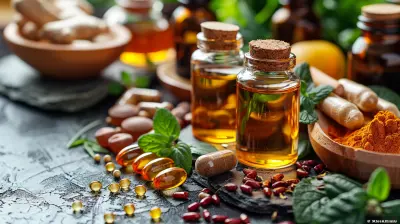Are You Getting Enough Vitamin B12 from Your Diet?
12 November 2025
Let’s be real — with so many health trends floating around (hey there, celery juice and kale everything), it’s easy to overlook the basic stuff. Like Vitamin B12. Not the flashiest nutrient out there, but oh wow, it’s important. Think of B12 as that behind-the-scenes superhero in your body — no cape, but if it goes missing, things get weird. Fast.
So, here’s the question: Are you actually getting enough Vitamin B12 from your diet? Or is this essential vitamin quietly slipping through the cracks of your morning smoothie?
Let’s dive in and see what’s going on with B12 in your life. By the end of this read, you’ll know where to get it, how much you need, and what your body might be trying to tell you when it's running low.
What the Heck is Vitamin B12, Anyway?
Great question, my curious friend.Vitamin B12 (also called cobalamin) is a water-soluble vitamin that plays a key role in nerve function, red blood cell production, and DNA synthesis. In simple terms? It’s crucial for keeping your brain sharp, your energy levels up, and your body running like a fine-tuned machine.
Unlike some other vitamins, your body can actually store B12 for years (mostly in the liver). But that doesn't mean you can ignore it completely. If your B12 intake is too low for a long time, those stores can dry up — and that's where the problems start.
Why Is Vitamin B12 So Important?
Imagine your body is like a high-powered office. Think of B12 as the HR manager making sure everyone’s doing their job. Without B12:- Your red blood cells can’t form properly.
- Your brain gets foggy or forgetful.
- Your nerves misfire.
- Fatigue hits you like a ton of bricks.
Not exactly the dream, right?
Let’s break it down a bit more:
| Function | Why B12 Matters |
|----------|----------------|
| Red Blood Cell Formation | Prevents anemia and keeps oxygen flowing through your body |
| Neurological Health | Supports brain and nerve function |
| Energy Production | Without B12, you’ll feel tired, sluggish, and unmotivated |
| DNA Synthesis | Essential for making new cells and staying healthy |
How Much B12 Do You Actually Need?
Here’s the thing — your daily B12 needs aren't massive, but getting just the right amount is crucial.According to the National Institutes of Health, these are the general recommendations:
- Adults: 2.4 micrograms/day
- Pregnant People: 2.6 micrograms/day
- Breastfeeding People: 2.8 micrograms/day
Sounds easy enough, right? Well… it depends on what you eat.
Who's Most at Risk for B12 Deficiency?
Not everyone is in the B12 danger zone. But some people are definitely more susceptible. Here's a quick checklist:- 🥦 Vegans and Vegetarians – B12 is naturally found almost exclusively in animal products.
- 👵 Older Adults – Stomach acid decreases with age, making it harder to absorb B12.
- 💊 People on Certain Meds – Antacids, metformin, and other prescriptions can mess with absorption.
- 🩺 Anyone with Digestive Disorders – Conditions like Crohn’s or celiac disease affect absorption big time.
If you fall into one of these categories, your B12 tank might be running low — and you might not even know it.
Signs You Might Be Low on B12
Your body isn’t subtle when it needs something — it’s more like that friend who texts in all caps.Here are some screaming signs that your body could be lacking B12:
- Constant fatigue (even after a full night’s sleep)
- Pale or yellowish skin
- Brain fog or memory issues
- Mood swings or depression
- Numbness or tingling in hands/feet (weird, but real)
- Tongue soreness or smoothness (yup, it can even affect your tongue)
Let’s be clear: these symptoms could be caused by other things too, but if multiple red flags are waving? It might be time to check those B12 levels.
Best Dietary Sources of Vitamin B12
Here’s the good news: if you’re an omnivore, getting B12 from your food can be pretty simple. Here’s a B12-rich hit list to stick on your fridge:| Food | B12 Content (Approx.) |
|------|------------------------|
| Beef Liver (3 oz) | 70+ mcg |
| Clams (3 oz) | 84 mcg |
| Salmon (3 oz) | 4.8 mcg |
| Tuna (3 oz) | 2.5 mcg |
| Eggs (2 large) | 1.1 mcg |
| Milk (1 cup) | 1.2 mcg |
| Yogurt (1 cup) | 1.4 mcg |
| Fortified Cereal (1 serving) | 6 mcg or more |
If you’re plant-based, don’t panic — some fortified foods and supplements can get the job done. Just be a little more intentional with your choices.
What About Vegans & Vegetarians?
Ah yes, the plant-forward crowd — you’re awesome, but your B12 intake can be tricky.Because B12 is mainly found in animal products, a 100% plant-based diet doesn’t naturally provide it. Don’t worry, though. You’ve got options:
- Nutritional yeast (look for fortified types)
- Plant-based milks fortified with B12
- Fortified breakfast cereals
- B12 supplements (available in tablets, sprays, or drops)
Bottom line? If you’re vegan or cutting way back on animal products, don’t rely on food alone — get tested occasionally and supplement as needed.
The Scoop on B12 Supplements
Let’s say you’re not eating a lot of B12-rich foods, or you have trouble absorbing it. Enter: supplements.You’ll find B12 in a few different forms:
- Cyanocobalamin – the most common and affordable form
- Methylcobalamin – a more natural form, often said to be better absorbed (especially for people with certain genetic variations)
- Sublingual tabs and sprays – these go under the tongue for quick absorption
- Injections – used for serious deficiencies, under medical supervision
If you’re just looking to top up your levels or stay on track, a simple daily supplement of 250–500 mcg usually does the trick. Talk to your doc before starting anything new, obviously.
What Happens If You Get Too Much B12?
Here’s something interesting: B12 is a water-soluble vitamin, which means your body flushes out the extra. So, taking more than you need generally isn’t harmful (unlike with fat-soluble vitamins like A, D, E, and K).But let’s not go overboard. Mega-dosing without reason isn’t magic. Stick within recommended ranges unless your doctor says otherwise.
Can You Check Your B12 Levels?
Yup — you totally can!A simple blood test from your healthcare provider can check your B12 levels. If yours are low, they might recommend a supplement or adjust your diet. It’s quick, easy, and can make a massive difference in how you feel.
Pro tip: If you’ve been feeling unusually tired or foggy, don’t just chalk it up to “being busy.” Your B12 tank might be running on empty.
Easy Tips to Keep Your B12 Levels on Point
Let’s land this plane with a few easy hacks to help you hit your B12 goals:1. Mix up your meals – Add B12-rich foods like fish, eggs, or dairy into your weekly lineup.
2. Check food labels – Especially if you’re eating vegan or vegetarian. Look for the words "fortified with B12".
3. Don’t skimp on breakfast – Fortified cereals and plant-based milks are your B12 BFFs.
4. Pop a supplement – Especially if you’re at risk or already low.
5. Get tested – Knowledge is power, folks.
So... Are You Getting Enough Vitamin B12 from Your Diet?
That’s the million-dollar question, isn’t it?If your diet includes plenty of animal products, you’re probably good. But if you’re plant-based, older, or dealing with absorption issues, it’s definitely worth a second look.
No judgment here — life gets busy, and sometimes breakfast is just coffee. But when you give your body the nutrients it needs (especially ones as important as B12), you feel better, think clearer, and have more energy to chase the good stuff.
So next time you're meal-planning or perusing the supplement aisle, maybe give B12 the attention it deserves. Your nervous system will thank you.
all images in this post were generated using AI tools
Category:
VitaminsAuthor:

Eileen Wood
Discussion
rate this article
1 comments
Mercy McKittrick
This article highlights the importance of Vitamin B12 for overall health. It's essential to assess your diet and consider supplements if necessary. Great read!
November 15, 2025 at 4:13 AM

Eileen Wood
Thank you for your feedback! I'm glad you found the article informative. Prioritizing Vitamin B12 is indeed crucial for health!


